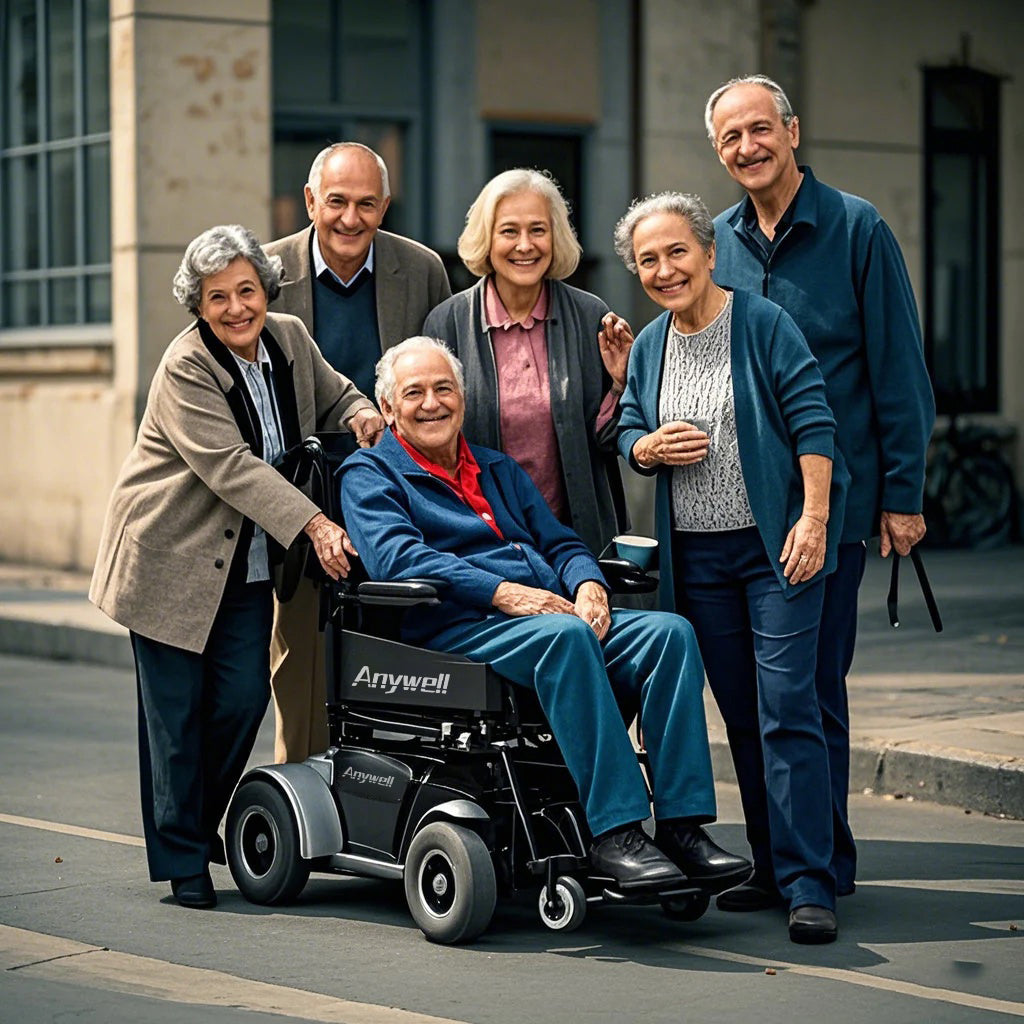In today's rapidly evolving world, the need for efficient and reliable mobility solutions has never been more pressing. For individuals with mobility impairments, a mobility wheelchair serves as a vital tool to regain independence. As technology advances, innovations like carbon fiber construction and electric propulsion are transforming these devices. This guide explores how Anywell's carbon fiber electric wheelchair—with its lightweight design and one-key folding—redefines mobility.

The Evolution of Mobility Wheelchairs
- Centuries of Development: From wooden hand-propelled frames to modern electric models.
- Key Milestones:
- 1950s: First electric wheelchairs for wider use.
- 2000s: Focus on lightweight materials (aluminum, then carbon fiber).
- Carbon Fiber Breakthrough: 5x stronger than steel, 75% lighter—ideal for portable designs.
Understanding the Need for Advanced Mobility
Market Growth Drivers
- Aging Population: Global seniors over 65 to reach 1.6B by 2050 (WHO).
- Disability Trends: 15% of the world's population lives with disabilities (World Bank).
Traditional Wheelchair Limitations
- Weight Issues: Steel models weigh 23-27kg, aluminum 11-16kg.
- Portability Flaws: Manual folding requires strength; electric models are bulky.
- Maneuverability: Difficult in tight spaces or on uneven terrain.
Anywell's Solution
- Carbon Fiber Frame: Weighs just 9.8kg (21.6lbs), 40% lighter than aluminum.
- One-Key Folding: Folds to 85×65×35cm in 5 seconds.
- Compact Design: Fits in standard car trunks (tested in Toyota Corolla and Honda Civic).
Carbon Fiber Advantages in Detail
Material Science Breakdown
- Strength-to-Weight Ratio: Tensile strength of 3,000+ MPa vs. steel's 500 MPa.
- Durability: Resists corrosion, UV damage, and impacts (tested with 10m drop test).
- Flexibility: 1.4% elongation at break, reducing risk of sudden fracture.
Design Impact
- Weight Reduction: Traditional electric wheelchairs: 32-45kg; Anywell model: 18.5kg (with battery).
- Load Capacity: Supports up to 120kg while maintaining maneuverability.
- Frame Lifetime: Estimated 10+ years with normal use (vs. 5-7 years for aluminum).
Anywell Carbon Fiber Electric Wheelchair: Technical Specs
Core Features
- Weight & Dimensions:
- Net weight: 18.5kg (including 24V/10Ah lithium battery)
- Folded size: 85×65×35cm
- Unfolded size: 120×65×90cm
- Performance Metrics:
- Motor: 250W brushless DC motor
- Top speed: 6km/h (adjustable via controller)
- Range: 20-25km per charge (tested on flat surface)
- Charging time: 4-6 hours to 100%
- Folding Mechanism:
- Electrically powered, one-button operation
- Folding time: <5 seconds
- Locking system: Dual-pin safety mechanism
Ergonomics & Safety
- Seating System:
- Padded with 5cm memory foam
- Adjustable backrest (90°-120°)
- Detachable armrests (height adjustable: 20-25cm)
- Safety Features:
- Anti-tip wheels (rear)
- Electromagnetic brakes (auto-engage on stop)
- LED headlights and taillights (IP65 waterproof)
- Emergency stop button
Benefits of Electric Mobility Wheelchairs
- Independence Boost:
- 87% of users report increased daily activity (Anywell user survey, 2024).
- Reduces reliance on caregivers by 65% (study by Mobility Research Institute).
- Health Impacts:
- Decreases upper body strain by 70% (vs. manual wheelchairs).
- Improves mental well-being: 92% of users report reduced anxiety (University of Oxford study).
- Accessibility Gains:
- Climbs 8° inclines with ease.
- Navigates 5cm curbs (tested in standard urban environments).
Using Your Anywell Wheelchair
Home Environment
- Navigates doorways ≥75cm wide.
- Fits standard elevators (tested in 110×140cm cabins).
Outdoor Use
- Terrain Performance:
- Paved surfaces: optimal performance.
- Gravel/grass: manageable with reduced speed.
- Avoid deep sand or mud.
Travel Tips
- Air travel: Meets IATA lithium battery regulations (under 100Wh).
- Car transport: Fits in trunks of compact cars (e.g., Volkswagen Golf).
Maintenance Guide
Routine Care
- Cleaning:
- Wipe frame with damp cloth (avoid harsh chemicals).
- Clean wheels with mild soap and water.
- Battery Maintenance:
- Charge before storage (recommend 40-60% capacity).
- Avoid full discharge; recharge when battery indicator shows 20%.
Professional Service
- Annual checkup recommended for:
- Brake system calibration
- Motor performance testing
- Battery health assessment

FAQs
- How much does it weigh? 18.5kg (including battery).
- What's the max user weight? 120kg.
- Can it be used in rain? Yes, but avoid prolonged exposure (IP54 water resistance).
- How to order? Pre-orders open on anywellshop.com from July 2024.
Conclusion
Anywell's carbon fiber electric wheelchair combines cutting-edge technology with user-centric design. With its 9.8kg carbon frame, 25km range, and one-key folding, it sets a new standard for mobility aids. Stay tuned for our launch—your path to enhanced independence starts here.





Leave a comment
This site is protected by hCaptcha and the hCaptcha Privacy Policy and Terms of Service apply.